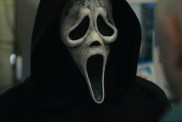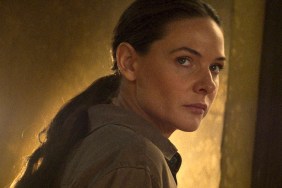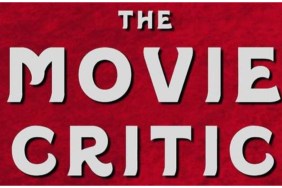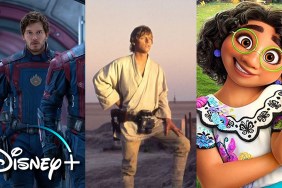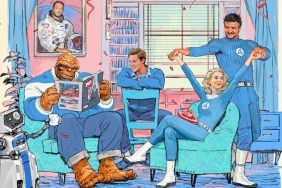While musical biopics tend to be a dime a dozen, there’ve only been a handful of biopics about rappers, mainly since comparatively, rap and hip hop are still fairly new musical artforms. Even so, in the last eight years, we’ve had 8 Mile with rapper Eminem as himself and Get Rich or Die Tryin’, in which rapper 50 Cent told his own story along with filmmaker Jim Sheridan. The big difference with Notorious is that it’s a biopic being done from the point-of-view of those who knew the late Christopher Wallace a.k.a. Biggie “The Notorious” Smalls.
After a nationwide casting call, the producers of the movie found newcomer Jamal Woolard (a Southern rapper under the moniker “Gravy”) to play the part of the extra-large rap icon who died in March 1997, then surrounded him with an amazing cast, including Angela Bassett as his mother, Derek Luke as Sean “Puffy” Combs, Biggie Smalls’ closest friend, confidante and collaborator, and Anthony Mackie playing Tupac Shakur, another friend whose relationship with Biggie went south as the two of them rose to fame. Many still believe that the latter is what ultimately got Biggie killed, something that’s addressed in the film, but it’s more about how Biggie got to the height of fame at such a young age.
ComingSoon.net has interviewed both Luke and Mackie before, and we’ve long felt they’re two of the brighter African-American actors making their way through the Hollywood system, so it was cool to get them together to talk about this movie.
ComingSoon.net: This is a cool movie to be involved with. Unlike “8 Mile” and the 50 Cent movie, this one comes from the view of another person rather than them making their own life story. You both have these key roles, playing people who we know so well from their time in the news and on television. Which one of you had the harder part to play? Derek, the person you play is still alive, and Anthony is playing someone with such a huge legacy who was so well known.
Anthony Mackie: I think it was equally difficult, just for different reasons. Mine was extremely hard because everybody thinks they’re a Pac historian. The amount of scrutiny brought on everybody who thought they knew Pac was just unbearable, the amount of E-Mails and the amount of notes I got. “I think Pac would do this” or “Pac would say it that way” or “I knew Pac, talk to me” you know what I mean?
CS: Derek, did you actually meet Sean or had you know him before or did you know people who knew him?
Derek Luke: I knew him, the icon, but I’ll give you an example, when he came to the set–he came to the set a couple of times–and he said to me and Jamal, he said, “Yo, you’re all doin’ it, but there was such more going on between me and big when we were on stage. There was a language that nobody understood.” Also, backstage, some of the guys would say, “Hey, man. Every time Puffy comes, it just seems like the show becomes all about him” and then Big was like, “No,” ’cause if you think about it, that’s what the East Coast/West Coast thing was about. Suge (Knight) said that “You all up in the videos,” but Biggie’s response wasn’t just to Suge. There was people in his camp who felt like Sean had too much time, and Biggie said to him, “Man, if it wasn’t for Puff, my game would be different. Puff adds so much to the show.” At that time, Puff developed his name by giving parties. He had produced two of the #1 R & B singles ever in history which was Mary J. Blige and Jodeci, so he started developing a name, so (continuing what Biggie said) “when Puff would come on, he would enhance and change my performance and he would take the crowd in a different way.” Suge’s comment was like, “Yo, you all up in the videos” but he didn’t know that Biggie was like “I need him.” So there was a lot of things that we discovered.

CS: Anthony, what did you learn about the relationship between Biggie and Tupac? In some ways, the relationship between Biggie and Sean was obvious, but with Tupac, it was always vaguer, because we only heard about once they started fighting. How did you look at it?
Mackie: The funny thing about their relationship was: when I started reading all the little unknown interviews that Tupac gave, it was so important because he was saying, “I didn’t feel like there was anyone changing the game the way I was, anybody out there who could really do it, and when I saw Big, I finally found somebody I could relate to, somebody who is from the streets, somebody who is gutter, but somebody who had the lyrical skills to really get people hyped. He had good show. I wanted to be around, I wanted to work with him, I wanted to do it.” Pac really felt a kinship to Biggie, and that was something I felt was very important to this film, and even Biggie said, “I probably seen Pac a thousand times on TV” and he was awestruck by him.
CS: What are your own relationships with rap music and to Biggie and Tupac’s stories? You both obviously come from different backgrounds – Anthony having gone to Juilliard, Derek having come to acting a different way. Could you relate to their stories either yourself or through anyone in your own lives that you could say, “Well, acting really helped me get out, the same way music helped them”?
Luke: Yeah, I think a life without a dream is a perfect example of what Biggie was going through ’cause you can’t forget that they were challenging each other to dream bigger and better than each other. He was just saying, “Hey, I’ll do this for you if you do this for me,” and I think it was the same for my story, the challenge was, “I gotta do something, I gotta leave, I gotta go from Jersey to the West Coast” to change the game and changing the game means changing your family’s economic system as much as changing your economic system.
Mackie: For me, I really related to the relationship between Puff and Big, because I had a whole bunch of Puffies in my life, be it different teachers, be it different mentors, just different people, and that’s what North Carolina School of the Arts was about, that’s what Julliard was about. Really just polishing those rough edges off. When I first came to New York, I was very disorganized in my thoughts. I had a lot of dreams, a lot of ambition, but just shooting that rock the wrong way, so once I got to Juilliard, I had a teacher named Richard Feldman that really put me in a position to obtain everything I wanted just with simple remarks on my day-to-day life. I felt like that’s what Pac needed. All he needed was one dude to just stand by and watch over his shoulder, instead of everybody sh*tting on him.
CS: I also wanted to ask about recreating the personas and the stage presence of these guys. We’ve seen these guys so much in music videos and on television… and especially getting P. Diddy’s dancing style, which is so specific and unique in its own way.
Mackie: Yeah, definitely not a rhythmic thing. (Everyone in the rooms laughs)
Luke: It was what it was. Even Puff asked Big, before he passed away, to produce him. It was just a changing of the guard, and Puffy was like “Yo, man, they feel me” because Puff wanted to be Biggie, and then Biggie wanted to be Puff. He wanted to see Puff get mocked at as wearing Versace, but then Big walks out wearing Versace, too.
CS: I was bummed we didn’t get to see you get on stage as Pac in this movie.
Luke: I would have loved to see that.
Mackie: I would have paid for the extra tape! The thing about this movie is that we have to keep reminding ourselves that it’s a film from Biggie’s perspective. The only thing we can hope for is for anyone to bless us with the opportunity to do the Tupac movie.

CS: A lot of people have been saying this after seeing this movie, that they want to see you do the “Thug Life” movie.
Mackie: Well, there’s two different perspectives. That’s the studio and everybody over at Amaru. Hopefully they’ll see the importance of that, because people have been asking for it for a long time.
Luke: I think that’s next though. I think when I saw Anthony on screen, I think (a few people) said, “Oh, yeah, definitely, they need to do a Pac story”, and I believe that his life… I can’t tell you why the order happened, but I can tell you that I know it’s next.
Mackie: It will just be such a different movie, that’s the thing. Just that whole Cali flavor would just make it a completely different movie. At the end of this movie, I was like, “Wow, that’s for Brooklyn” every time we got to the end. New York is such an integral part of every movie that’s shot here, and with this, Brooklyn was just… every time they showed the skyline, that Brooklyn swagger, that Brooklyn demeanor, that Brooklyn savvy that Big had, that Jay-Z has, that’s just bred in them. I think that the Cali swagger would just make it different with the Chucks and Dickie suits.
CS: In the movie, you two don’t have a lot of scenes together though you’ve been doing most of your press together. Have the two of you had a chance to talk about your shared experiences? You both have worked with Spike Lee at different times of your careers, for instance. Have you had a chance to talk about that stuff at all?
Mackie: Nah, it’s been something I’ve been dreaming about maybe for the past… when I saw “Catch a Fire,” I’ve wanted to make a conscious effort to try, because there’s no reason why… and that was one of the reasons I was so excited about doing this project when they said he was going to be in it.
CS: Not realizing that you weren’t going to have any scenes with him.
Mackie: Yeah (laughs). I was like “Cool!” but it’s really cool to see somebody who is like Pac and Biggie, there’s not too many people you can relate to. There’s not too many people you can admire, respect, look at and say “Dang!” That’s it, and it’s just really cool to be in that position. To have a “playmate.”
Luke: I’ve heard Anthony’s name in many a conversations ’cause we’re in the industry, and many times, people try to tie his art, connect it to mine, but I said, “That can’t be right, because God created Anthony as an actor, and he created me,” and I believe that God is perfect, meaning that he doesn’t put people on collision courses. Many times, that can be a Jersey to New Orleans course, and it’s not like that. It feels good to hear that somebody who is respected and to be mentioned in the same breath, it just says a lot. Like he said about coming together, because sometimes, thinking the last generation, they just had to come up. Now we get a chance to come up and mix.
Mackie: Right, right…
CS: Could you each talk about what you’re doing next? Derek, I know you’re doing the Tyler Perry movie which should be a different experience.
Luke: Oh, you know what? It’s different in the fact that he’s a self-made man, and I felt like I’ve been on a leadership campaign in a sense that playing Puff, I learned a lot about visionaries, fulfilling your dreams, and almost like printing your own movie. When I was working last year on “Miracle at St. Anna,” I think the writers strike was happening, and there was only a few production companies that was working, and that was MGM and Tyler Perry Studios. I was like, “How the heck were they not affected by the writers strike.” He said that they just went out basically and said, “Oh, is that what you all want? Alright, we’re with you all, let’s get rolling” and I was just like, “Man, that’s amazing.”
CS: I got to see “Hurt Locker” in Toronto and that was pretty amazing.
Mackie: Yeah, “Hurt Locker” is coming out, hopefully early summer, and I’m about to start shooting this project called “Babylon” down in Jamaica about this Rastafarian who teaches this kid the lessons of life through the lessons of Halie Selassie and Ja, and just goes on this road to perdition with this kid, teaching him the lessons of life through Rastafari.
Notorious opens nationwide on January 16, 2008.
